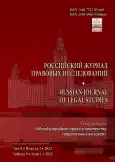Preliminary Objections in the International Legal Proceedings as an Element of International Legal Policy of State
- Authors: Magomedova O.S.1
-
Affiliations:
- Moscow State Institute of International Relations (University) MFA Russia
- Issue: Vol 9, No 1 (2022)
- Pages: 23-32
- Section: Trending topic
- URL: https://journal-vniispk.ru/2410-7522/article/view/91156
- DOI: https://doi.org/10.17816/RJLS91156
- ID: 91156
Cite item
Abstract
In modern international legal scholarship, preliminary objections are considered procedural means for preventing the consideration of an international dispute in a judicial proceeding. This approach is adopted in works on the classification of preliminary objections. However, preliminary objections must be examined not only autonomously within a concrete litigated case, but as an integral part of the international legal policy of the concerned state. Under the concept of international legal policy, every state must participate in the development of international law following its own special strategy for advancing its international legal positions on different issues. Through coordination of wills on the elaboration of international law, every state aspires to construct its strategy, which would persuade the international community of validity and necessity of an advanced view on certain international issues with minimal concessions to other views.
International legal policy is pursued at every life cycle stage of an international legal norm from law making to interpretation, application, and dispute settlement. Preliminary objections can be considered elements of international legal policy on par with other actions and declared positions of the state in the international legal field. On the basis of the international legal policy perspective, this article explores the hypothesis about the interdependence between the raised objections and the outcome of the case.
This work reveals that the preliminary objections present the attitude of the state to the international dispute or to the proceedings in general, but they are not a determinative factor for forecasting the state’s conduct in the proceedings, and most importantly, its compliance with a binding judgment. The review of the practice of International Court of Justice demonstrates that the raise of preliminary objections does not always indicate the weakness of the state’s international legal arguments for maintaining its standpoint in the judicial process nor predetermines non-compliance with the judgment. Concurrently, the examination of preliminary objections as an integral part of international legal policy on a concrete issue broadens the understanding of the state’s position in the dispute.
Full Text
##article.viewOnOriginalSite##About the authors
Olga S. Magomedova
Moscow State Institute of International Relations (University) MFA Russia
Author for correspondence.
Email: olga.magomedova.96@mail.ru
ORCID iD: 0000-0003-0593-3101
PhD Student of Department of International Law
Russian Federation, MoscowReferences
- Punzhin SM. Processual'noe pravo Mezhdunarodnogo Suda: predvaritel'nye vozrazheniya (obshchaya chast'). International justice. 2011;(1):46–60. (In Russ.).
- Rosenne Sh. The Law and Practice of the International Court, 1920–2005. Leiden – Boston: Martinus Nijhoff Publishers. Vol. I. 4th Ed. 2006. 1892 p.
- Hwang MSC, Cheng LS. The Chimera of Admissibility in International Arbitration – And Why We Need to Stop Chasing It in Hwang M.S.C Selected Essays on Dispute Resolution. Singapore: Singapore International Arbitration Centre. 896 p.
- Tomuschat C. Article 36 in A Zimmerman et al (eds). The Statute of the International Court of Justice: A Commentary. Oxford: Oxford University Press. 2nd Ed. 2012. 2016 p.
- Ndiaye TM. Admissibility before the International Courts and Tribunals. Journal of Law and Judicial System. 2018;2(1):21–48.
- Crawford J. Brownlie’s Principles of Public International Law. Oxford: Oxford University Press. 8th Ed. 2012. 888 p.
- de Lacharrière GL. La politique juridique extérieure. Paris: Economica. 1983. 229 p.
- Tunkin GI Teorija mezhdunarodnogo prava. Ed. by Shestakov LN. Moscow: Izdatel'stvo «Zercalo», 2006. 416 p. (In Russ.).
- Virally M. Réflexions sur la politique juridique des États in Virally M. (ed.) Guy Ladreit de Lacharrière et la politique juridique extérieure de la France. Paris: Masson. 1989. P. 394–411.
- de Lacharrière GL. L’influence de l’inégalité de développement des États sur le droit international. RCADI. 1973;2(139):22–268.
- Hughes D. How States Persuade: An Account of International Legal Argument Upon the Use of Force. Georgetown Journal of International Law. 2019;50(4):839–946.
- Ratner S, Johnstone I. Talking International Law: legal argumentation outside the courtroom. Oxford: Oxford University Press. 376 p.
- Pellet A. Le Sage, le Prince et le Savant (A propos de ‘La politique juridique extérieure’ de Guy de Lacharrière). Journal du Droit International. 1985;(2):407–414.
- Odermatt J. Patterns of avoidance: Political questions before international courts. International Journal of Law in Context. 2018;14(2):221–236.
- Gal'perin M. Politizaciya prava ili legalizaciya politiki? O justiciability i doktrine «politicheskogo voprosa» na primere mezhdunarodnogo pravosudiya. International justice. 2020;4(3): 45–58. (In Russ.).
- Lauterpacht H. Function of International Law. Oxford: Oxford University Press. 2011. 512 p.
- Tama NM. Nicaragua v. United States: The Power of the International Court of Justice to Indicate Interim Measures in Political Disputes. Penn State International Law Review. 1985;4(1):65–87.
- Scott GL, Carr CL. The ICJ and Compulsory Jurisdiction: The Case for Closing the Clause. The American Journal of International Law. 1987;81(1):57–76.
- Ginsburg T, McAdams RH. Adjudicating in Anarchy: An Expressive Theory of International Dispute Resolution. William and Mary Law Review. 2004;45(4):1229–1339.
- Rachkov I. Resheniya Mezhdunarodnogo Suda po delu o hrame Prea Vihear. International Justice. 2015;4(16):24–34. (In Russ.).
Supplementary files







